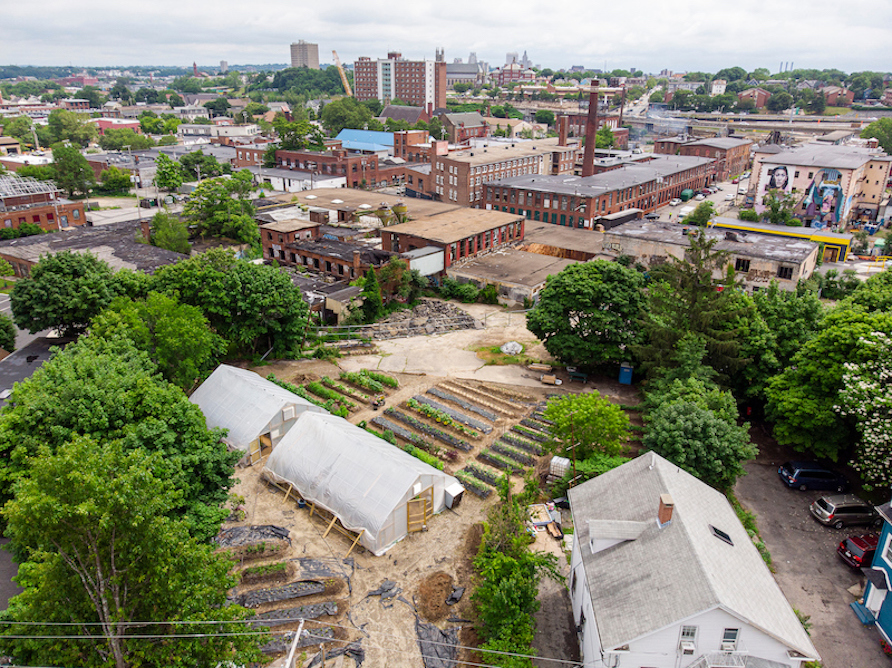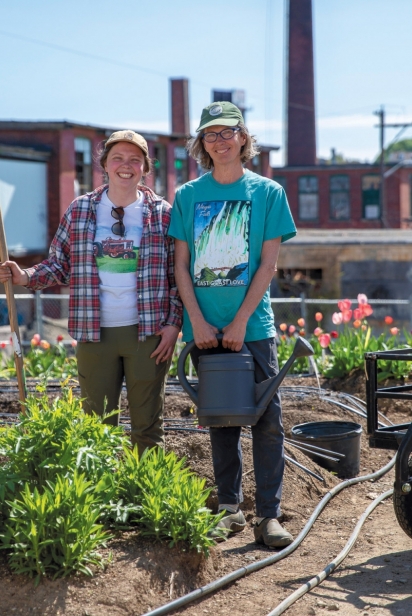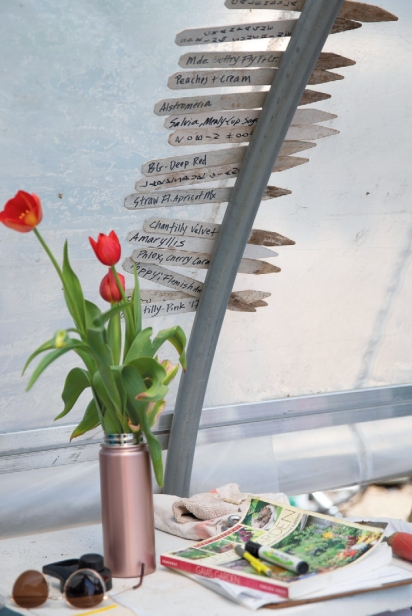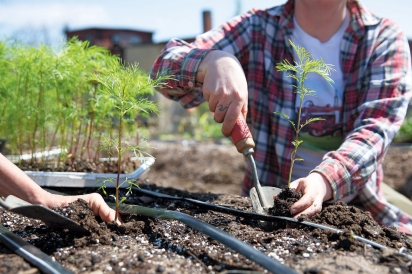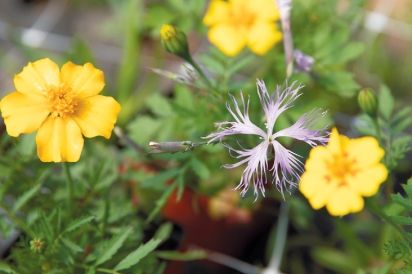What Cheer Flower Farm
An Inner-City Flower Farm Sparks Joy with Its Mission to Donate Beautiful Blooms
Farming is hard, as anyone who’s tried it will tell you. Growers are at the mercy of weather, animal pests and sheer exhaustion. But the energetic women of What Cheer Flower Farm put all that aside for the joy their crops bring to others.
The year-and-a-half-old enterprise, located in a down-at-the-heels Olneyville neighborhood, brightens the lives of people undergoing stress and difficult circumstances by providing flowers—for free— through the agencies that serve them.
“We’re growing flowers on purpose,” says Anne Holland, a cofounder of the nonprofit flower farm. “We’re not growing tomatoes. Other people are doing that, and God bless them.”
Holland and her partner-farmers, Shelby Doggett and Marian Purviance, came together through a mutual friend. Over coffee at Seven Stars Bakery, they shared their ideas for an urban space where they could raise flowers to give away to people who may be going through a health crisis or a life-changing personal challenge.
“The stars aligned,” says Holland. An hour later, they shook hands and the aptly named (after Roger Williams’s famous greeting to the Narragansetts) What Cheer Flower Farm was born.
Doggett, the executive director, is a 26-year-old graduate of the University of Vermont with a degree in ecological agriculture. She wanted to come back to Providence after teaching urban farming to high school students in Boston and Woonsocket. She learned how to make farming fun for her inner-city students, a skill she uses with volunteers at the urban farm.
Purviance is the director of horticulture at What Cheer. A former estate gardener for Newport and Portsmouth’s grander gardens, she says flowers are in her DNA. “Growing cut flowers for social good is my way of giving back after years of reaping joy from something so simple but out of reach for so many.”
Holland, a journalist and amateur flower grower, wanted to spend more time out of her office. She’s involved in their marketing and is president of the farm’s board of directors.
Their plans may have come together easily because the women had specific ideas on how to bring their garden into fruition. They wanted land close to a public bus line so they could interact with an inner city population: Approximately 50,000 people live within a mile of Olneyville. The surrounding three-decker houses help protect the plot from heavy winds. They also made sure the land was not prone to flooding, a problem in that part of the city.
The 2.7-acre lot they settled on was part of the former Colonial Knife factory on Atwood and Magnolia streets, within sight of busy Route 6. They decided to buy the land—a brownfield site—rather than rent, so as not to lose control over their substantial investment.
“We were very determined to make it work and we wanted to improve a derelict space,” says Doggett.
Their first project was to remove 6,000 feet of cracked and broken asphalt from the old parking lot and replace it with a protective fabric, gravel and clean loam. Nurturing thousands of seedlings through a particularly hot summer and raising money for seeds and supplies took up much of their time in their first growing season last year.
But their biggest obstacle was finding a regular water source. For much of the summer they doused each plant by hand with a sort of Rube Goldberg system that involved long hoses, a fire hydrant and eight-foot-high water storage tanks. That jury-rigged irrigation system has since been replaced by a reliable water supply.
All of their hard work paid off when they delivered their first bouquet in June 2018 to brighten the public areas of Ronald McDonald House. “When they first called to explain that they simply wanted to drop off flowers to brighten our families’ day, it was a no-brainer,” says Development Officer Nicole Anderson. “We look forward to continuing our bright and cheerful partnership.”
When victims of domestic violence arrive at Sojourner House, they are greeted with a What Cheer bouquet. Clients arrange the donated flowers during support group meetings. “It’s cathartic to work with your hands while talking through difficult topics and the results were beautiful,” says Eileen Rasmussen, chief intake coordinator. She explains that the flowers also brighten the three shelters operated by Sojourner House.
Meals on Wheels received small posies for delivery to its clients throughout the summer. By the end of the growing season in November, 10,000 daylilies, sunflowers, zinnias, dahlias and other blooms were donated to the PACE Organization of Rhode Island, St. Mary’s Home for Children, Dorcas International and other helping agencies. They expect to triple that harvest to 30,000 flowers for 15 nonprofits by the end of the current growing season in November.
Sixty volunteers recruited through social media helped produce last year’s bountiful crop and the team, including Program Coordinator Allison Costa and a part-time field apprentice, is grateful for their help. But the experience is gratifying for the volunteers, too. Line Daems, the owner of Kreatelier on Hope Street in Providence, spends two hours a week planting seedlings, weeding and cutting flowers. “As the owner of a small business, I always look at selling goods and increasing profit. When I volunteer for the flower farm, I feel that for a moment I do whatever is needed to help someone else. I feel happy and relaxed.”
Doggett, Purviance and Holland are becoming integral members of the Olneyville community, working with job training agencies like Youth Build Providence and Groundwork Rhode Island. Little Rhody Beekeepers offers workshops in beekeeping and pollinator habitat classes near the newly installed beehives. There are plein air classes for neighbors who are invited to paint, sketch or photograph the gardens.
“When the flowers are in bloom, the contrast with the urban landscape is stunning,” says Doggett.
A barn scheduled for completion this fall will be used for workshops, to prepare flowers for delivery and to nurture seedlings onsite instead of in Purviance’s apartment. It will be a space for volunteers to “recycle joy” when they repurpose unsold blooms gathered from local florists after flower-centric holidays like Mother’s Day.
All of this work and urban renewal costs money. “We’ve been writing grants like crazy,” says Doggett. One innovative fund-raiser is the online sale of greeting cards that feature glowing flower images. The sale of one card pays for a bouquet. What Cheer also rents flower arrangements to nonprofits for their fund-raising events. The fee is small but they get double use from the flowers that are then passed along to spread more joy.
This innovative trio seems to get as much joy from their hard work as they give to the community. The flower recipients discover that people care about them when they are going through a rough patch. And that’s what drives everyone involved in the farm, says Holland. The women of What Cheer Flower Farm believe that people have a natural connection to flowers and nature. Gardening brings calm and an appreciation for beauty. “In today’s world that’s something everyone deserves, just as much as food and shelter,” says Doggett.
Join What Cheer Flower Farm at their annual Flower Festival! A benefit with art, flowers, local food and drink. Enjoy the wall of blooms for fabulous photos plus a spectacular sunset. The art, flowers and food are for sale: The sunset is a bonus. Guests can ride there on the Gallery Night Providence bus tour. Thursday, September 19, 2019, 5–9 pm. (Rain date September 21.)
For more information on Flower Festival tickets, volunteer opportunities and more, visit WhatCheerFlowerFarm.org.


